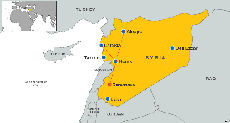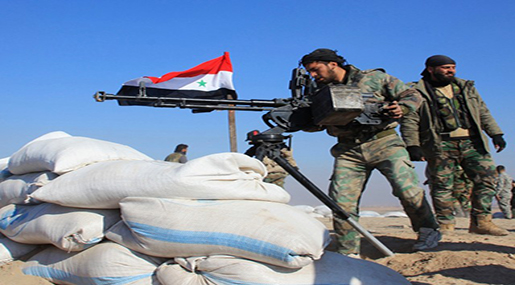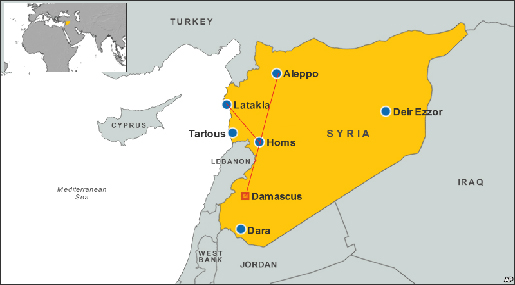
The Diplomatic and Military Battle for Syria’s ’Y’

Darko Lazar
For months, diplomats and delegates have been gearing up for the third round of peace talks over the war in Syria. But as the party finally got underway in the Swiss city of Geneva, some of the guests were a no-show.

The Syrian opposition platform - headed by Mohammed Alloush, the leader of Saudi-backed terrorist group ‘Army of Islam' - mashed up rebranded terrorists and opposition figures under the umbrella of the recently-formed High Negotiations Committee [HNC], which was undecided on whether to attend the peace negotiations, as the already delayed talks commenced.
By Friday morning, there was "nothing new", as a senior HNC delegate so eloquently put after leaving a meeting hall at a luxury hotel in the Saudi capital, where the Committee has been holding talks for days.
HNC coordinator Riad Hijab, who is a former Syrian prime minister and the only senior government official to defect since the start of the Syrian conflict, said that, "we could go there [Geneva], but we will not enter the negotiating room if our demands aren't met".
The demands, which include the lifting of sieges, a halt to air strikes and the release of ‘wrongfully' detained prisoners of conscience, are just as unrealistic and vague as the ones which helped obstruct previous talks to end the war in Syria, held in 2012 and 2014.
Back then, the so-called opposition delegation demanded that Syrian President Bashar Al-Assad step down as a precondition to any negotiations. They have since dropped the ‘Assad must go' mantra in line with some of their foreign backers, but are no closer to attaining any real political legitimacy - both inside and outside Syria.
For his part, the UN Special Envoy to Syria, Staffan de Mistura, appeared in a video message in the lead-up to the Geneva talks, directly addressing the Syrian people.
"You must know also that we count on you to raise your voice to say ‘khalas'", De Mistura said.
But militant leaders like Mohammed Alloush are not exactly a pleasant bunch that came of age in the ‘no means no' environment. So it would be a bit of a longshot to assume that they would care to hear what the Syrian people have to say. And unfortunately for De Mistura, the ferocity of this conflict was never dictated by the Syrian people.
So where does that leave the prospects of success in Geneva, and will those talks actually make any difference on the ground in Syria?
The lack of commitment to a political solution by to so-called opposition, which now consists of al-Qaeda offshoots, is perhaps best demonstrated by their unwillingness to come to the negotiating table. But Mohammed Alloush and Riad Hijab are hardly an independent entity and are only following the line of their masters.
Only days before the Geneva talks were due to start, US Vice President Joe Biden was in Turkey to underline Washington's lack of commitment to the political process in Syria.
"We do know it would be better if we can reach a political solution but we are prepared, if that's not possible, to have a military solution," Biden said.
Indeed, the Americans have been hoping, for some time now, for a military resolution to the Syrian conflict. These days, however, Biden can do little else than send thinly veiled messages to militants in Syria to, in essence, continue fighting.
De Mistura's Geneva talks were therefore never anything more than a political farce; a mechanism designed to give Wahhabi militant groups that idolize Osama Bin Laden international legitimacy, while allocating desperately needed breathing room for them to regroup and resupply.
For almost five years, militant groups have been holding the Syrian nation hostage - starving its population, decimating its infrastructure and working to dismember the secular state along sectarian lines. More than 250,000 dead later, Washington and its allies are losing the war.
The militants are on the retreat, from Daraa in the south to Lattakia in the northwest.
The Syrian army, Lebanon's Hizbullah and Iranian forces backed by Russian airstrikes have made significant strategic gains in recent weeks, expanding their grip over the urban, industrialized part of the country - or Syria's ‘Y'.
This represents the territory stretching from Damascus in the south, Homs in the center, Lattakia in the northwest, and Aleppo slightly further northeast, which takes the shape of the letter Y when dotted out on the map.

Control of Syria's ‘Y' is the real game changer, because control over urbanized Syria means control over the whole country. The eastern, oil rich, Daesh-controlled Deir ez-Zur has recently become a target of Russian airstrikes and, along with the porous desert in the east, would be liberated at a later date.
For the Americans, Turks and Saudis, as well as their assets on the ground in Syria, negotiations under these circumstances would undoubtedly give the Damascus government the upper hand, leaving entitles like the HNC unable to demand much in the way of ‘realistic' concessions.
The director of the Center for Syncretic Studies, Joauqin Flores, thinks that the boycott of the Geneva meeting by the HNC "is a sign of strength for the Syrian government - which at the very least was able to use the opportunity to register their public position and use the event as a show of support and sovereignty."
And at least for the time being, the battle for Syria is likely to play out on the battlefield rather than the negotiating table.
Source: al-Ahed News



